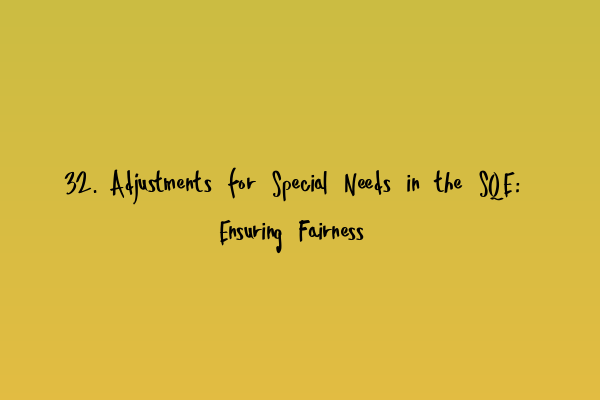32. Adjustments for Special Needs in the SQE: Ensuring Fairness
When it comes to taking the Solicitors Qualifying Examination (SQE), fairness should be a top priority. Everyone should have an equal opportunity to demonstrate their knowledge and skills without any undue barriers. This is especially true for individuals with special needs who may require certain adjustments to ensure they can fully participate in the examination process. In this article, we will discuss the importance of adjustments for special needs in the SQE and how they contribute to creating a fair and inclusive examination environment.
The Purpose of Adjustments
The SQE is designed to assess the competence of prospective solicitors, regardless of their background or circumstances. It is important to acknowledge that different individuals have unique needs and challenges, some of which may require adjustments to the examination process. The purpose of these adjustments is to level the playing field and allow individuals with special needs to demonstrate their skills and knowledge in a fair and equitable manner.
Adjustments can range from extra time allocations to the provision of assistive technology, alternative formats for examination materials, or even supportive arrangements such as a separate testing room or a reader/scribe. These adjustments are not intended to give an unfair advantage to individuals with special needs; rather, they aim to provide them with an equal opportunity to showcase their abilities.
It is crucial to remember that adjustments are not a sign of weakness or incompetence. They are simply a means of accommodating individuals with special needs, ensuring that they are not disadvantaged due to circumstances beyond their control. By providing appropriate adjustments, the SQE upholds the principles of accessibility, diversity, and fairness.
Who Qualifies for Adjustments?
The SQE recognizes that individual circumstances vary, and that some individuals may require adjustments to fully participate in the examination process. The qualification criteria for adjustments may include, but are not limited to, individuals with physical disabilities, visual impairments, hearing impairments, dyslexia, mental health conditions, or any other condition that may impact their ability to perform at their best during the examination.
Qualifying for adjustments is not an automatic process. Individuals seeking adjustments must provide appropriate evidence of their special needs to the SQE assessment authorities. This evidence may include medical or diagnostic reports, educational or professional assessments, or any other relevant documentation. It is important to note that all documentation provided must be recent and relevant to the individual’s current condition.
If you believe you qualify for adjustments, it is essential to review the SQE guidelines and procedures for requesting accommodations. Following the correct process will help ensure a smooth and timely evaluation of your needs, allowing you to focus on your preparation for the examination.
Ensuring Fairness and Inclusivity
The SQE aims to create a fair and inclusive examination environment for all candidates. By offering adjustments for special needs, the SQE provides equal opportunities to individuals who may face additional challenges due to their circumstances. This enables them to demonstrate their true potential and knowledge without being hindered by their disabilities or conditions.
By embracing the principles of fairness and inclusivity, the SQE acknowledges that diversity strengthens the legal profession. Individuals with special needs bring unique perspectives, experiences, and skills that enrich the legal community. By providing necessary adjustments, the SQE ensures that no one is left behind and that all deserving individuals have an equal chance to succeed.
It is worth noting that the adjustments provided for individuals with special needs do not lower the standards or integrity of the SQE. The examination is rigorous and demanding for all candidates, regardless of any adjustments they may receive. Adjustments simply level the playing field, allowing individuals with special needs to demonstrate their competence on an equal footing.
Conclusion
Adjustments for special needs in the SQE are essential to ensure fairness and inclusivity. By recognizing that individuals may require accommodations to fully participate in the examination process, the SQE demonstrates its commitment to accessibility and diversity. The provision of adjustments does not compromise the integrity of the examination; instead, it offers equal opportunities for all candidates to demonstrate their competence. If you believe you qualify for adjustments, make sure to review the SQE guidelines and procedures and seek the necessary accommodations early on. Remember, your special needs should not be a barrier to achieving your goals in the legal profession.
Related Articles:
- Mastering Time Management in SQE: Strategies for Efficient Exam Completion
- Conquer the Multiple Choice Questions (MCQ) in SQE1
- Mastering Effective Revision Techniques for SQE Success
- Scenario-Based Questions SQE2: Enhance Your Problem-Solving Skills
- Functioning Legal Knowledge (FLK) Mocks: Strengthening Core Legal Concepts
